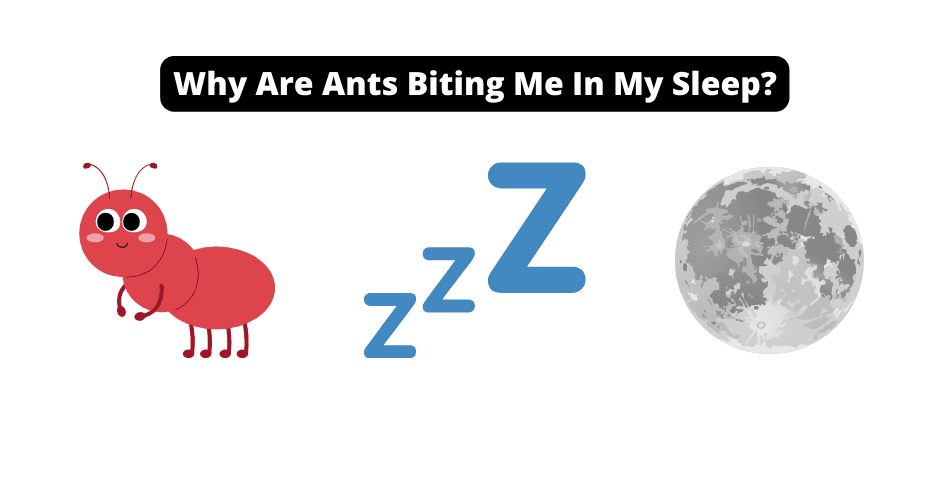There are two possible reasons the ants are biting you in your sleep.
Either they found edible stuff on your skin, and they’re trying to eke it out, or, as they do their usual crawl, you moved your body, and the ant interpreted the movement as a threat, thus biting you in self-defense.
It’s not uncommon finding ants in the kitchen, pantry, or bathroom because they forage for food and water in these places.
Finding ants in bed is less common, but it happens sometimes.
Thus, being attacked by ants when sleeping implies you have a big ant problem, especially if it’s recurrent.
Therefore, you need to identify what attracts ants to your bedroom because… they’re not supposed to be there.
Let’s get right to it!
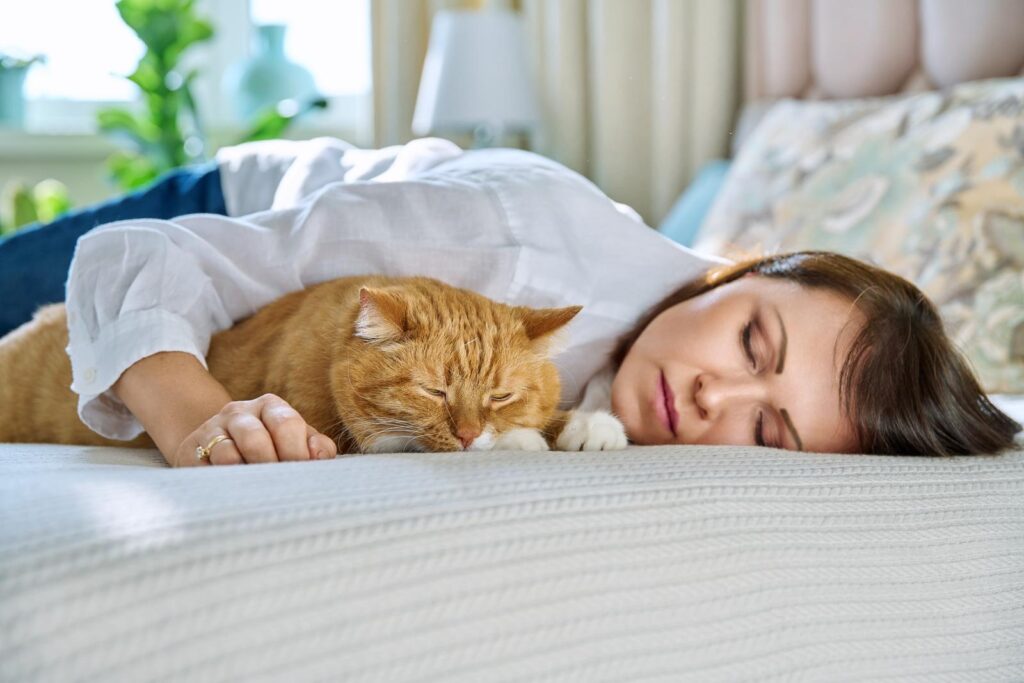
Why do I have ants in my bedroom?
Most likely, you have edibles or food crumbs in your bedroom.
Workers’ top responsibility is looking for food to feed the colony.
Workers are intelligent and prefer the closest and easiest food source to the nest (who doesn’t!!).
If you have food items, particles, or leftovers in the bedroom, reachable during worker ant food search parties, ants will be interested in checking it out.
Ants in your bedroom mean you have an ant infestation problem close by.
Thus, to fully eradicate the ant problem, your focus should be finding the source.
Depending on ant species, most ants have nests close to a reliable water and food source.
The ant nest could be hidden in cracks, crevices, or behind walls.
Notably, carpenter ants live in nests dug into wooden structures.
When you encounter them in your bedroom, they’re looking for food, and the nest is nearby, possibly hidden somewhere in the wooden parts of your house.
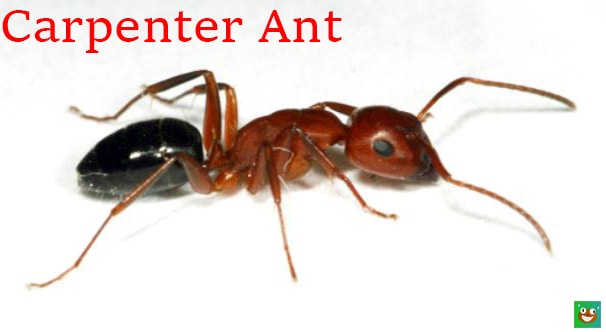
Bites in my sleep, are they ant bites?
If you get bitten by bugs in your bedroom, ants are one of the possible pests that could bite you.
Specific bugs bite and sting humans when asleep.
Other bugs most likely to cause sleep bites are bed bugs, mosquitos, fleas, or mites.
Ants complete the list of the five bugs that can bite you in your sleep.
But only some species of ants bite or sting people.
The most well-known is the fire ant species.
So, it is vital to establish precisely which bug is responsible for the bite.
Why?
The type of pest determines the best bug control method to use.

Which ants bite or sting people in their sleep?
Fire ants are the most typical domestic threat.
Most other ants that infest our homes don’t bite, and they’re so tiny that the bite effect is barely noticeable, even if they bite.
Tiny, harmless ants include the common black ant, pharaoh ants, and most small ant types.
Many tiny ants will invade your bed in their errands to find food.
Their presence is a nuisance, but they will harmlessly crawl in and out of bed.
However, larger ants bite, and those with a stinger…sting.
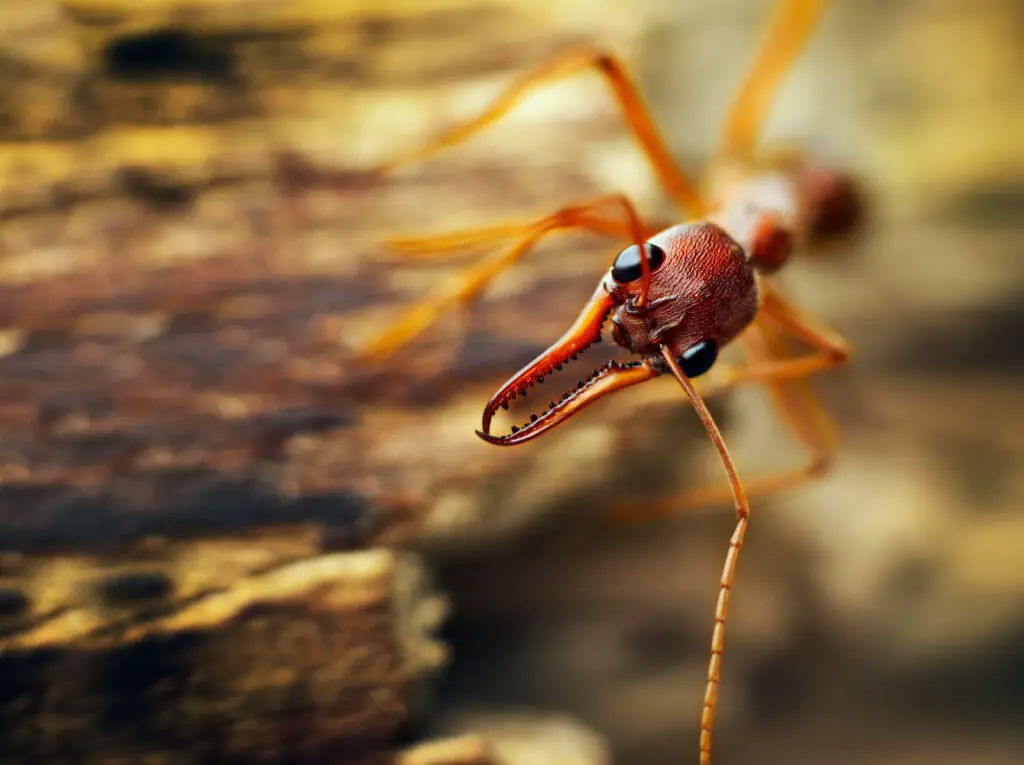
If you’ve ever been bitten or stung by ants, you know how dangerous they can be if they make their way to the bed.
Here are two possible reasons ants bite you when asleep;
Mineral Particles on your skin
The residue left by sweat on your body is rich in mineral salts such as sodium, potassium, and chloride, essential to ants well being.
The ants will dip their mandibles into your skin as they try to collect the mineral salts.
Stinging in self-defense
If ants find their way into your bed as they forage for food, they may sting or bite in self-defense.
Even when we sleep, our bodies and skin are sensitive to the touch.
We subconsciously react to get rid of whatever may be touching us.
Depending on the type of ant, body movement may be interpreted as a threat to the safety of the ant.
On such occasions, some ants tend to bite in self-defense.
For instance, army ants detect prey by movement and only attack when they detect motion.
Relevant Viewing:
What can I do if ants bite me in my sleep?
When you confirm an ant attack in bed, especially if it’s by a dangerous type like fire ants, evacuate the bed immediately.
Ant bites itch.
Naturally, we tend to react to the itching by scratching the itchy area.
Even though the sting or bite is highly irritating, it’s essential to avoid scratching the bite area.
Medics recommend washing the bite site with soap and water.
Do not pop the red welts. When the welts get exposed, they easily get infected.
The ants that bite inject formic acid into the bite area.
Those that sting injects the venomous liquid with a stinger commonly found at the tip of the ant’s abdomen.
The signs of an allergic reaction depend on the ant type.
Fire ants bite simultaneously and will do so in quick succession of 7-8 stings.
After making the bite, it pivots with the mandibles and then makes circular motions as it stings.
Thus, the fire ant bite resembles a circle, and the developing watery blisters are circular.
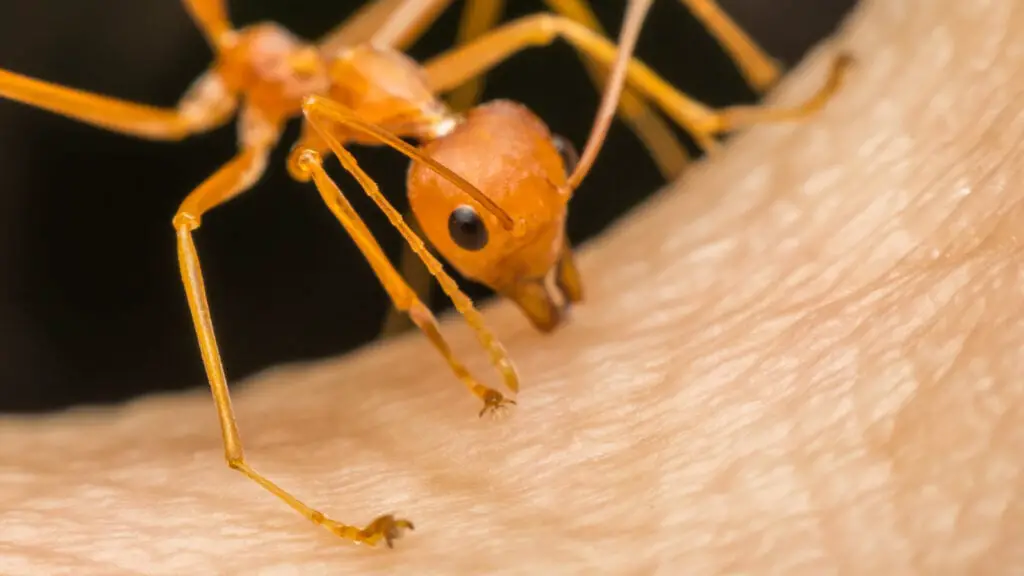
As highlighted earlier, several types of bugs bite humans when sleeping.
Flea bites or bed bug bite signs will look different from ant bites.
Flea bites are small, firm, and reddish. Though itchy, they don’t develop into blisters.
Bed bug bites resemble small flea bites.
They are not immediately itchy but develop blisters with time.
Bed bug bites are common on the neck, arms, and face.
I know this may sound weird, but trust me; I hope it’s ants before bed bugs and fleas.
Getting rid of bed bugs or fleas is about 10x harder than getting rid of ants.
Identifying the type of bug or species of ant ensures you take the most suitable medical treatment and bug control action.
References:
https://www.ncbi.nlm.nih.gov/books/NBK470576/
https://www.ncbi.nlm.nih.gov/books/NBK541118/
https://www.cdc.gov/parasites/bedbugs/faqs.html
How can you keep ants from your bedroom?
The best way to avoid ants in your bed is by observing hygiene and cleanliness.
Here are some tips;
- Avoid eating in bed. This practice ensures no food particles that could attract ants are spilled or left in bed. Not eating in bed is particularly important if you live in areas perennially infested by ants.
- Clean your bedroom after eating food. Regularly wash the bed materials to get rid of unseen food particles.
Not eating in bed helps to avoid an ant attack.
However, getting rid of ants from your bedroom is a different game, necessitating taking pest control measures.
To keep the ants from the bedroom, begin by tracing the entry points.

Follow the ant trails and locate the nest.
Once you find the entry holes, seal or treat them with pesticides.
The ant trail could lead to an ant mound located outside the house. Once you find the mound, eliminate them using organic or natural ant-control substances.
What can you use to get rid of ants in the bedroom?
In response to an instant invasion, say, where ants find you asleep, some common home compounds come in handy.
You can spray a solution of orange squeeze mixed with vinegar and water, and an Orange Guard Organic Solution is a potent pesticide.
You can also use typical pest control aerosols like Raid.
A good alternative is Terro.
Home chemicals and aerosols are handy for a quick but temporary ant control action.

These chemicals kill and repel ants but are ineffective for largescale infestations and not ideal when targeting the elimination of entire colonies.
Always be careful not to spray directly on the bed.
Spray on trails; the killing and repellent effect will drive the ants away.
For long-term colony control, use ant baits.
Amdro Ant Block or Terro Liquid Ant Bait are effective killers.
When an ant invasion is highly severe, you may have to call a pest exterminator.
All said and done, cleanliness is the best way to keep ants out of your bed.
Avoid eating food in bed or leaving leftovers in the bedroom.
In an unfortunate attack by dangerous ants, use instant-killing ant-killing substances or baits to get rid of entire ants colonies in the long run.
